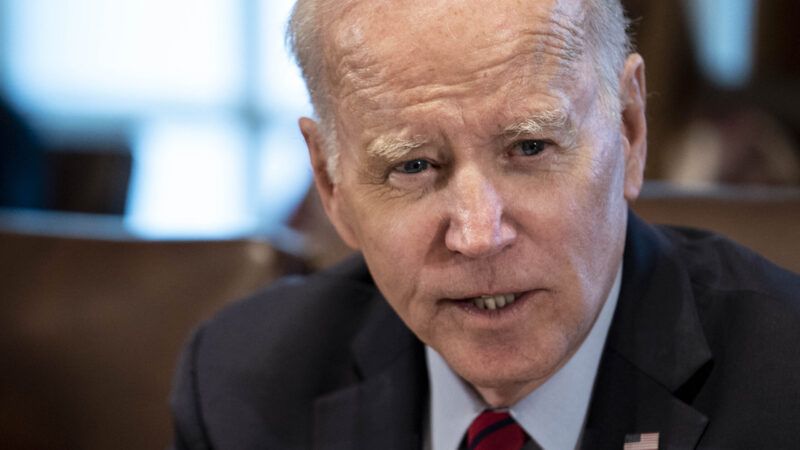Biden's Immigration Plan Lays Out a Tougher Border, New Legal Pathway for Some Migrants
There's still much more to be done to establish fair and efficient processes at the border.

Yesterday, President Joe Biden announced a new immigration framework to address record-high migrant crossings at the U.S.-Mexico border. The carrot-and-stick plan will increase expulsions for migrants who attempt to enter the U.S. illegally, and it also lays out a legal pathway for migrants from certain countries to live and work in the U.S. temporarily.
The framework will triple refugee resettlement from Latin America and the Caribbean in 2023 and 2024, for an annual cap of 20,000. Each month, up to 30,000 migrants combined from Venezuela, Nicaragua, Haiti, and Cuba may come to live and work in the U.S. on a two-year status if they secure an American sponsor and pass background checks.
Meanwhile, the White House says "individuals who irregularly cross the Panama, Mexico, or U.S. border after the date of this announcement will be ineligible for the parole process and will be subject to expulsion to Mexico," which will accept up to 30,000 migrants monthly from Venezuela, Nicaragua, Haiti, and Cuba who have been expelled. Mexico will do so under an expansion of the pandemic-era Title 42 order, which allows for the immediate expulsion of border crossers. Previously, Mexico only accepted Mexicans, Guatemalans, Hondurans, and Salvadorans removed under Title 42. (It recently began accepting expelled Venezuelans as well.) Unauthorized migrants "will be increasingly subject to expedited removal to their country of origin and subject to a five-year ban on reentry," according to the White House.
Certain aspects of the framework will likely help reduce the number of migrants arriving at the U.S.-Mexico border, which has been a great challenge for the Biden administration so far. Under the new parole pathway, migrants can begin the process to secure legal passage to the U.S. from their home countries rather than doing so through an asylum claim (which can only be initiated at a port of entry or on U.S. soil). This could help save them a dangerous northward journey and reduce overcrowding at the border.
"I expect fewer illegal crossings if the administration implements the proposed plan as it outlined it yesterday," David J. Bier, associate director of immigration studies at the Cato Institute, tells Reason. "The new legal migration programs along with the expansion of Title 42 will lead to a meaningful reduction in unlawful crossings by incentivizing people to wait for the legal option to become available to them."
The pathway for Nicaraguans, Cubans, and Haitians mirrors similar programs established for Ukrainians and Venezuelans last year. Those programs helped reduce unlawful crossings among those groups, says Bier: "The Ukrainian parole program eliminated migration to the U.S.-Mexico border by Ukrainians. Venezuela's program has already turned migration to be mostly legal." Last summer, Customs and Border Protection reopened ports of entry to Haitians, which "basically ended illegal immigration by Haitians," Bier explains.
"These facts demonstrate the power of having robust legal options for people to migrate, and I think the more success stories are shown, the more countries the policy will be applied to," says Bier.
There are also major benefits to the sponsorship-based approach, through which U.S. citizens can financially support migrants and help them integrate. Sponsors have an incentive to help migrants get jobs—and financial independence—quickly. However, the new pathway may end up eventually filtering sponsored migrants into the asylum backlog. "The status only lasts two years and people will likely wind up in the overwhelmed asylum process," says Sam Peak, a policy analyst at Americans for Prosperity. "What we truly need is actual private refugee sponsorship, where people can privately sponsor somebody to permanently stay in the country if they are eligible for refugee status."
There are serious logistical downsides to the Biden administration's new framework. Many migrants flee their home countries under duress and without time to fully plan an escape. For those leaving repressive countries like Venezuela, Nicaragua, Haiti, and Cuba, it could be extremely difficult to fly to the U.S. or obtain passports from their governments—both requirements of the parole pathway. There are also many migrants who began their northward journeys before the policy was announced and are now stuck in limbo as U.S. immigration agents turn them away.
Parts of the framework are likely to face legal challenges too. "Congress specified directly that crossing illegally should not be considered as a basis for denying someone the right to apply for asylum," says Bier, who is "hopeful courts will strike it down, and the administration will decide it is unnecessary because the new legal processes are working to end illegal immigration on their own." The framework's Title 42 expulsion authority may well be on shaky ground, as the pandemic policy will be taken up by the Supreme Court this spring.
Expanding legal migration pathways is a critical step in solving the chaos at the border, and the new parole program will help many people from repressive countries reach safety. The Biden administration deserves praise for this. But many people in precarious situations will flee their countries and will nonetheless be barred from seeking asylum in the U.S. if, for instance, they don't have passports or failed to seek protection in a third country. There's still much more to be done to establish fair and efficient processes at the border.

Show Comments (88)